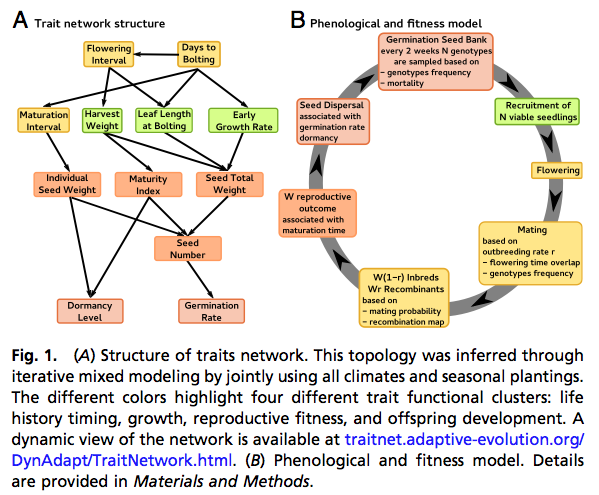Arabidopsis Research Roundup: May 13th
This weeks Arabidopsis Research Roundup includes two peer-reviewed papers and the release of a preprint. Vinod Kumar from the JIC provides an audio description of a study that investigates the role of the SWR1 complex in the defence response. Secondly Jessica Metcalf from Oxford is a contributor on a study that looks at population responses of Arabidopsis to simulated climate change. Finally John Brown (University of Dundee and the James Hutton Institute) is the corresponding authors on a preprint that introduces a new Arabidopsis transcriptome annotation.
Berriri S, Gangappa SN, Kumar SV (2016) SWR1 chromatin-remodelling complex subunits and H2A.Z have non-overlapping functions in immunity and gene regulation in Arabidopsis Molecular Plant http://dx.doi.org/10.1016/j.molp.2016.04.003 Open Access
Vinod Kumar (John Innes Centre) is the corresponding author on this study that investigates the incorporation of the histone variant H2A.Z into Arabidopsis nucleosomes. This histone variant is important in the control of differential gene expression although its role in plant immunity is not well understood. H2A.Z is integrated into nucleosome by the SWR1 chromatin remodelling complex that contains a number of subunits namely PHOTOPERIOD-INDEPENDENT EARLY FLOWERING1 (PIE1), ACTIN-RELATED PROTEIN6 (ARP6), and SWR1 COMPLEX 6 (SWC6). Interestingly each subunit plays discrete roles in different pathogen response processes including basal resistance, enhanced resistance, effector-triggered immunity or in altered JA/ET-mediated immunity. Genome wide expression analysis reveals a role for PIE1 in the crosstalk between signalling processes and overall that SWR1c components might have distinct non-overlapping roles during gene regulation and expression.
Dr Kumar kindly provides a brief audio description of this paper:
Fournier-Level A, Perry EO, Wang JA, Braun PT, Migneault A, Cooper MD, Metcalf CJ, Schmitt J (2016) Predicting the evolutionary dynamics of seasonal adaptation to novel climates in Arabidopsis thaliana PNAS http://dx.doi.org/10.1073/pnas.1517456113 
Mathematician Jessica Metcalf (Oxford) is an author on this US-led study that uses Arabidopsis to investigate the effect of climate change on evolution of fitness. Over four seasons plants were grown under four climatic conditions (present day, overall increased temp, winter-warming and poleward-migration temp) and 12 traits were measured as a proxy for fitness evolution. The data was used to simulate evolutionary trajectories over a 50-100 year period. The authors found that each climatic condition resulted in different outcomes where populations with fewer founding genotypes or less initial diversity adapted less well to altered conditions. This suggests that successful adaptation to climate change is linked to the diversity within a given population prior to the change occurring.
Zhang R, Calixto C, Marquez Y, Venhuizen P, Tzioutziou N, Guo W, Spensley M, Frey N, Hirt H, James A, Nimmo H, Barta A, Kalyna M, Brown J (2016) AtRTD2: A Reference Transcript Dataset for accurate quantification of alternative splicing and expression changes in Arabidopsis thaliana RNA-seq data. Preprint BioRxiv http://dx.doi.org/10.1101/051938 Open Access
This preprint includes researchers from the Universities of Dundee (John Brown), Glasgow (Hugh Nimmo) and Vienna and the James Hutton Institute and introduces AtRTD2, a new transcriptome for Arabidopsis and AtRTD2-QUASI for expression analysis and quantification of alternatively spliced isoforms in RNA-seq data.
Podcast: Play in new window | Download
[…] (Cambridge) is a contributor on this study that is led by researchers in Seoul, South Korea. In the last ARR, Vinod Kumar described work that looked into the role of the SWR1 chromatin-remodeling complex and […]